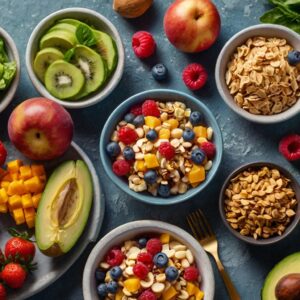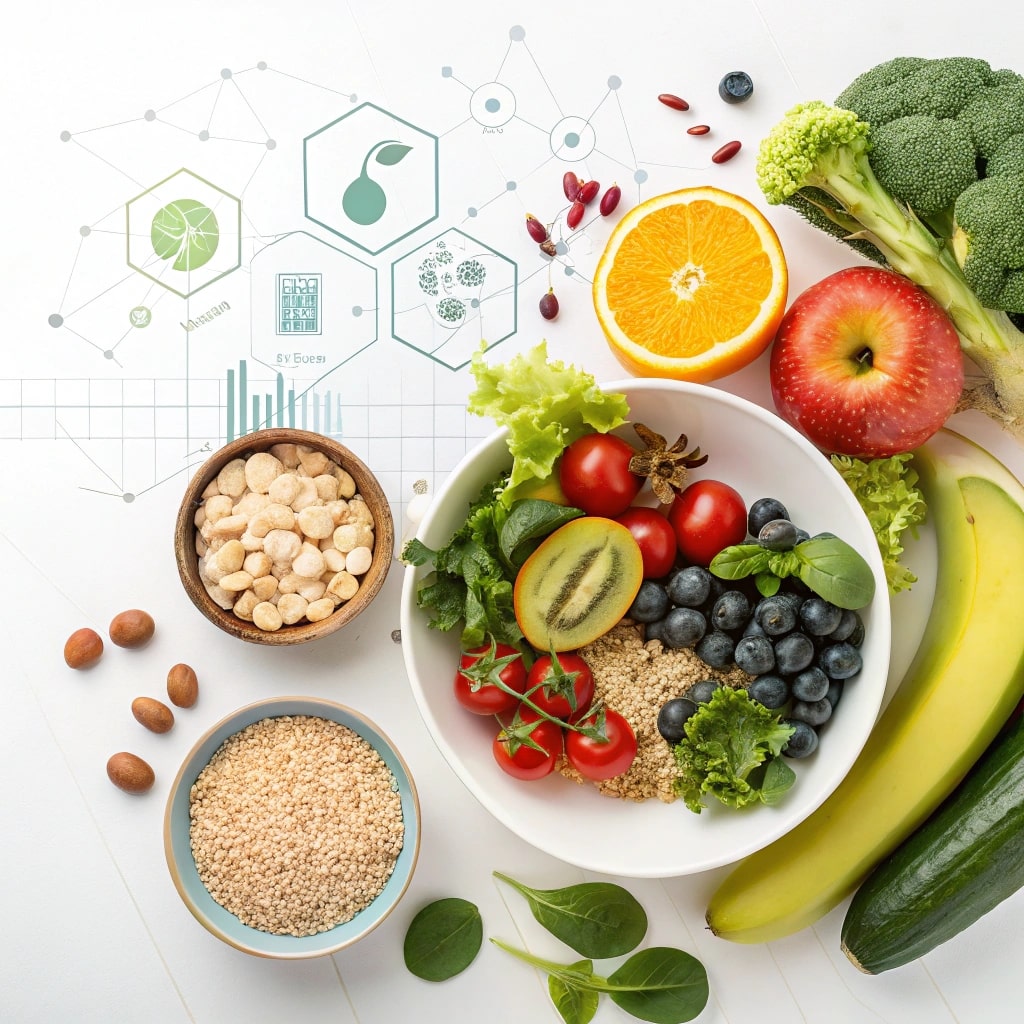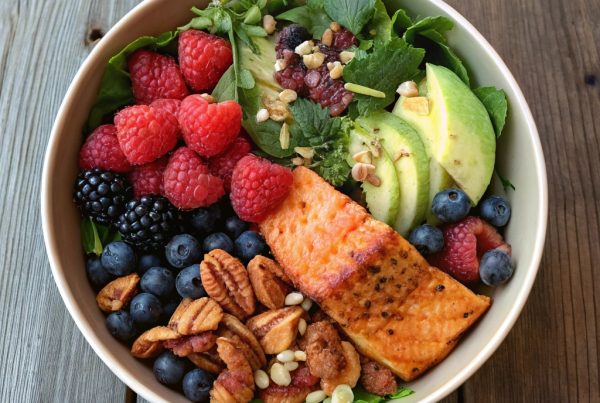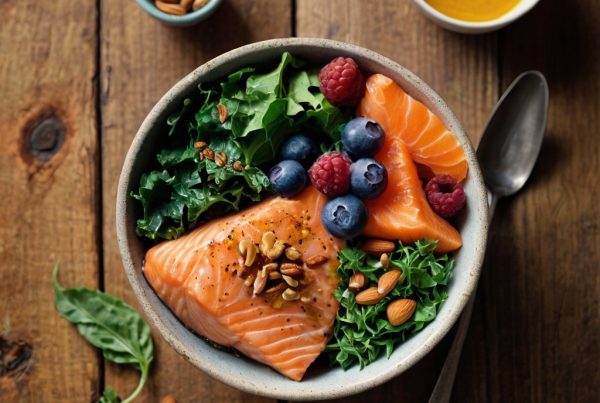Are you tired of feeling sluggish, lethargic, or stuck in a never-ending cycle of weight gain and energy crashes?
You’ve tried every fad diet under the sun – kale smoothies to detox teas. But nothing seems to stick.
You know what’s missing though? A deep understanding of your body’s unique needs.
By tapping into that knowledge, you’ll unlock a new era of vitality and wellness.
You’re about to discover how personalized nutrition can be your secret weapon for transforming not just your diet but also your overall health.
Understanding Your Body’s Nutrition Language
Your body has a unique way of communicating its nutritional needs, and tuning in to this language can be incredibly empowering. It’s as if your body is trying to tell you what it really wants – but often getting lost in translation.
Think about it: have you ever noticed how certain foods make you feel like a new person? The energy boost from a well-balanced meal, the satisfaction of sinking into a warm, nourishing bowl of soup. These feelings are not just coincidental; they’re your body’s way of saying “I’m listening” to its own needs.
The key is to pay attention to these whispers. Do you find that you always feel more alert and focused after eating foods rich in protein and healthy fats? Or do certain carbohydrates leave you feeling sluggish but satisfied? By paying attention to these patterns, your body can start to communicate what it really craves – allowing for a revolution in the way nutrition is approached.
It’s not about trying to force-feed yourself a diet that doesn’t resonate. It’s about tuning into the subtle language of hunger and satisfaction. Listen closely, and you’ll discover that your body has been telling you all along exactly what it needs to feel its best – it just needed someone to listen
Using Technology to Read Your Nutrient Needs
To revolutionize your nutrition, you need personalized insights that take into account your unique needs and goals. Smartphone apps like MyFitnessPal and Lose It! can help track daily food intake, macronutrient ratios, and monitor nutrient deficiencies.
Imagine being able to plan your meals with precision, taking into account the specific nutrients required for optimal performance during intense workouts. For instance, if you’re an avid cyclist, a personalized app can provide detailed breakdowns of calorie requirements tailored to your ride type and intensity level. This is not just about tracking calories; it’s about optimizing fueling strategies that support muscle recovery.
These apps have helped real users optimize their nutrition plans by providing personalized recommendations based on user input. By using these tools, individuals can gain insights into how different nutrients work together and make informed decisions to achieve optimal health outcomes.
Take a look at Sarah, for example. She used an app like MyFitnessPal to track her daily food intake and discovered that she was consistently consuming too much sugar due to overconsumption of fruit smoothies. The app suggested alternative sources of essential vitamins and minerals from other foods, which helped Sarah fine-tune her diet.
Beyond tracking nutrient deficiencies, technology can help with personalized meal planning and integration with wearable devices like fitness trackers or smartwatches. Imagine being able to sync your activity data with a nutrition plan that takes into account your specific needs based on the types of exercises you do.
By making use of such technologies, individuals can significantly enhance their daily routines and make healthier choices about what they eat.
To conclude, incorporating personalized nutritional insights through apps like MyFitnessPal or Lose It! can be transformative for those seeking to improve their nutrition.
Finding Food You’re Genetically Wired for
 The relationship between genetics and nutrition is more complex than you think. Recent research suggests that our genes can influence not only our weight but also what we like to eat.
The relationship between genetics and nutrition is more complex than you think. Recent research suggests that our genes can influence not only our weight but also what we like to eat.
One study published in the Journal of Nutrition found that individuals with a specific variant of the F9 gene were 30% more likely to consume higher amounts of omega-3 fatty acids, which are commonly found in fish and seafood. This suggests that genetic predispositions can influence food preferences, particularly for nutrients that have been advantageous for survival.
You are naturally attracted to foods that have been favored by your ancestors: Research has shown that humans tend to like certain flavors, textures, or colors because those traits were beneficial for our evolution. For example, the Inuit people’s diet was rich in fatty fish and whale blubber due to their Arctic environment, which is thought to be the reason behind their preference for high-fat foods.
However, it’s essential to consider that modern diets are often less diverse than previous generations’, with increased access to a wide range of food options. This can lead to a lack of exposure to nutrients that were crucial for survival in ancestral environments. As such, your genetic predispositions may be triggered by the availability and nutritional value of foods in your region.
But what about you? Have you ever noticed how your cravings change as you age or move to a new location? Research has shown that our bodies respond differently to various diets based on factors like genetics, environment, and socioeconomic status. This is why it’s crucial to consider the unique nutritional needs of individuals from diverse backgrounds.
A study published in the journal Nutrients found that genetic variants associated with high-fat food preferences were more common in populations living near rivers or oceans, highlighting the importance of environmental influences on our diet and health.
Incorporating foods into your meals can have a significant impact on your overall well-being, particularly if you’re genetically predisposed to certain dietary patterns. For instance, adding fatty fish to your breakfast routine might help improve heart health in individuals with specific genetic variants.
Your genes also play a role in what you enjoy eating and why. Research has shown that humans tend to like certain flavors, textures or colors because those traits were advantageous for our survival. However, there is evidence suggesting that some people may not be genetically predisposed towards high fat foods but are instead more likely to prefer them due to environmental factors.
You’re probably familiar with the idea that your ancestors ate different diets than you do today. This phenomenon is known as “cultural transmission.” It’s possible for this cultural influence on food preferences, along with genetic influences, to affect what we eat and how much of it.
Making Healthy Choices with Personalized Diets
Revolutionize Your Nutrition: Unlocking Personalized Diets for Optimal Results
The key to unlocking human potential lies in tailoring nutrition plans to individual needs. The average person’s body is composed of complex systems that require precise nutrient and element combinations to function optimally.
A consultation with a healthcare professional who understands your health history, genetic predispositions, and lifestyle habits can be crucial in creating a personalized plan. For instance, Sarah, a fitness enthusiast who lifts weights three times a week, requires more protein than Emily, an avid runner who focuses on cardio sessions. Similarly, pregnant women like Rachel need specific nutrients such as folic acid to support healthy fetal development.
However, there’s more to personalization than just selecting ingredients from the menu. Understanding food interactions and sensitivities is equally important. Some individuals may react negatively to gluten or lactose intolerance, while others have no issue with either component.
Environmental factors like region of origin and cultural background also play a significant role in dietary choices. For example, people living in tropical regions require different nutrients due to their unique environmental conditions. By considering these factors, you can create a tailored diet that caters to your specific needs.
The world of nutrition is rapidly evolving, with researchers utilizing machine learning algorithms and genomic data to predict nutritional requirements. Recent studies have shown remarkable results from personalized diets, outperforming one-size-fits-all approaches in improving overall health outcomes.
Innovative techniques like these can lead to better health benefits than traditional diet plans.
Your dietary choices can be influenced by environmental factors such as your region of origin or cultural background. Even so, there are numerous ways to ensure that you’re getting a balanced diet.
Uncovering the Science of Personalized Nutrition Planning
Did you know that genetics play a significant role in how we respond to different foods? Research suggests that personalized nutrition planning can improve health outcomes by up to 30%. By analyzing an individual’s unique genetic profile, healthcare professionals can provide tailored dietary recommendations and potentially life-changing results.
The science behind this approach is rooted in understanding how genetic variations affect nutrient metabolism, absorption, and utilization.
It all starts with identifying specific genes that impact our response to certain nutrients or food compounds. For instance:
- The COMT gene affects the body’s ability to metabolize antioxidants, while variants in the BDNF gene can influence fat storage and weight loss.
- Differences in the MTHFR gene impact folate synthesis and antioxidant levels.
These genetic variations can be used to develop personalized nutrition plans that optimize nutrient uptake, minimize adverse reactions, and promote optimal health outcomes. By leveraging this knowledge, healthcare professionals can identify specific nutritional needs for each individual.
For example, let’s say someone has a variant of the APOC1 gene that affects insulin sensitivity. Based on their genetic profile, a healthcare professional might recommend increasing fiber intake or adding certain nutrients to help regulate blood sugar levels. This tailored approach can make all the difference in improving health outcomes and preventing chronic diseases.
The innovative application of personalized nutrition planning also opens up new avenues for research into how genetics influence nutritional needs. By studying these relationships, scientists can develop more effective interventions for various health conditions. The science behind this concept holds promise for revolutionizing our understanding of human biology and transforming the way we approach nutrition.
Creating a Meal Plan That Works with Your Genetics
Revolutionizing your nutrition starts with understanding your unique genetic makeup, which is essential for creating an effective meal plan. Research suggests that certain genetic variants can significantly impact carbohydrate metabolism and energy production.
For example, studies have shown that individuals with insulin sensitivity-related genetic variants (e.g., TCF7L2) may benefit from focusing on low-glycemic index foods or adjusting carb intake to optimize glucose regulation.
By understanding your genetic predispositions, you can tailor your diet to specific nutritional needs. This might involve:
- Foods high in fiber for gut health support
- Macronutrient balances that cater to individual energy requirements
Don’t try every diet trend that comes your way. Instead, dive into the world of personalized nutrition by understanding how genetics impact your nutritional needs.
Generic diet plans often fall short due to their one-size-fits-all approach. To truly optimize nutrient uptake and minimize deficiencies, you must consider the intricate interplay between genes, gut health, and personalized nutritional needs.
To create a successful meal plan that works for you specifically, research specific scientific studies or findings to support key points about genetic variants affecting nutrient metabolism. This will allow you to:
- Focus on low-glycemic index foods to manage blood sugar levels
- Adjust your carbohydrate intake based on individual insulin sensitivity
By following these steps and tailoring your diet accordingly, you can revolutionize your nutrition and achieve optimal health results.
The Power of Gut Bacteria in Nutrient Absorption
 Your gut microbiome is like a high-performance team – it works best when each member has their job to do. An imbalance of beneficial bacteria, however, can compromise its delicate balance and significantly impact your body’s ability to absorb essential nutrients.
Your gut microbiome is like a high-performance team – it works best when each member has their job to do. An imbalance of beneficial bacteria, however, can compromise its delicate balance and significantly impact your body’s ability to absorb essential nutrients.
When nutrient-rich foods enter your digestive system, they’re broken down by the trillions of microbes that call your gut home into smaller molecules like proteins and carbohydrates. A well-functioning gut microbiome ensures these vital nutrients are absorbed for energy production, immune function, and overall health. But an imbalance can lead to impaired nutrient absorption, leaving you feeling lethargic even with a balanced diet.
Certain strains of beneficial bacteria have been shown to improve insulin sensitivity more effectively than others. Research has identified specific types like Lactobacillus and Bifidobacterium that help regulate blood sugar levels. An overgrowth of pathogenic bacteria can disrupt this balance, leading to complications in nutrient absorption.
The gut microbiome is influenced by various factors, such as antibiotics or the consumption of processed foods, which can upset its delicate balance. For instance, certain antibiotics may kill off beneficial bacteria while allowing harmful ones to thrive.
Recognizing the importance of a balanced gut microbiome for optimal nutrient absorption requires taking proactive steps. By incorporating more fermented foods into your diet or exploring probiotic supplements that support beneficial bacteria growth, you can promote a healthier gut environment and boost your body’s ability to absorb nutrients.
Getting to Know Your Microbiome and Its Impact on Health
The human microbiome is often referred to as a second brain, playing a vital role in mental health and overall well-being. A diet rich in processed foods can disrupt its delicate balance, leading to changes in digestion, energy levels, and even mood regulation.
Think of your gut microbiome like a complex city with different neighborhoods and ecosystems that interact and influence one another. Just as urban planning can impact the quality of life for residents, so too can food choices on our microbiome’s ecosystem. Foods high in sugar and unhealthy fats can lead to an overabundance of bad bacteria, disrupting this balance.
Research suggests that a personalized diet approach could reduce symptoms by 30% – such as those experienced by individuals with irritable bowel syndrome (IBS). On the other hand, healthy foods promote good microbes which help digest nutrients properly. A well-balanced microbiome enables our body to absorb essential vitamins and minerals more efficiently.
By incorporating specific food groups into your diet you can support a healthier gut, boost energy levels and even improve mental clarity.
Some key takeaways on how we can tailor diets for optimal microbial balance:
- Certain types of fiber promote good bacteria growth
- Leafy greens like spinach have been shown to increase beneficial microbes in the digestive tract
- Omega-3 rich foods help reduce inflammation and support gut health
For instance, research suggests that consuming fermented foods high in probiotics such as kimchi can boost immune function and mental well-being by up to 20%. On the other hand, skipping breakfast or having an irregular eating schedule has been shown to decrease cognitive performance.
How AI is Revolutionizing the Way We Eat
 Revolutionize Your Nutrition with Personalized
Revolutionize Your Nutrition with Personalized
Artificial intelligence (AI) is transforming the way food is produced, processed, and consumed. AI’s impact on nutrition extends far beyond personal dieting apps and meal planning tools.
Personalized recommendations are being integrated into grocery shopping experiences through machine learning algorithms that suggest relevant products based on your eating habits, dietary restrictions, and preferences. For instance, a study found that using such platforms can reduce food waste by 20% among busy professionals who rely on these recommendations to plan their meals for the week. By doing so, individuals are more mindful of their eating habits and make healthier choices.
Imagine having access to tailored dietary guidance that takes into account your unique needs from genetic testing results to medical history. AI-powered kitchen devices can help optimize cooking techniques by suggesting the perfect timing for adding specific ingredients or adjusting heat levels, ensuring perfectly cooked meals every time. A busy mom of two raved about how an intelligent oven helped her cook a stress-free dinner without compromising on flavor.
AI-driven nutritional analysis allows healthcare professionals to provide personalized dietary guidance tailored to an individual’s unique genetic profile, metabolic rate, and lifestyle choices. This precise approach enables individuals with diabetes or obesity to make informed decisions about their diet while reducing the risk of chronic diseases. For example, research has shown that following a carefully crafted meal plan can help manage blood sugar levels and improve mental clarity in children with type 1 diabetes.
Moreover, AI-powered food waste reduction strategies identify optimal storage conditions for perishable items based on your consumption patterns. By optimizing these processes, we can significantly reduce the staggering amount of food wasted globally each year – approximately 30% of all produced food is lost or wasted. This change can have a profound impact on public health and sustainability.
Imagine having access to intelligent kitchen assistants that predict cooking doneness with real-time temperature readings, ensuring perfectly cooked meals every time without compromising flavor. By making the most of these advanced technologies, we can improve our overall well-being while reducing unnecessary waste at home levels and in commercial food establishments.
Revolutionize Your Nutrition with Personalized Strategies
Aiding Food Intolerances Using Machine Learning Techniques
Great nutrition plans won’t be effective for everyone. Inaccurate dietary recommendations can cause frustration, discomfort, and even long-term health problems.
The impact of personalized approaches is substantial – a tailored diet can help alleviate symptoms associated with food intolerances, improve overall well-being, and increase the chances of achieving weight loss goals. This is because machine learning-driven strategies consider an individual’s unique nutritional needs based on their medical history, lifestyle choices, and genetic factors.
Take advantage of this opportunity to experience optimal nutrition success. Personalized approaches will yield better results than one-size-fits-all plans by minimizing the risk of adverse reactions and maximizing nutrient absorption.
Get started today with a personalized approach that can significantly improve your overall health.




